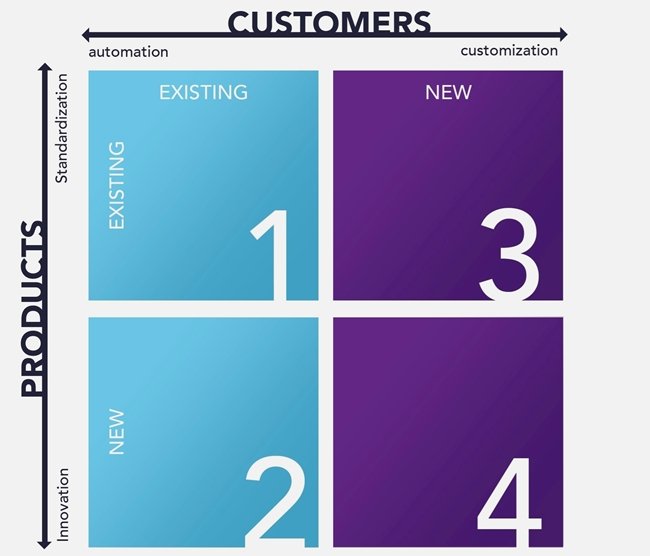Upselling is part art and part science that requires a delicate blend of business know-how, intuition, and relationship-building. It looks different in every industry, but the basic tenets always apply.
Upselling may seem more manageable when business is booming, but how can you upsell in times of economic uncertainty—more specifically, now, in the midst of global pandemic like COVID-19.
Sure, it would be easy to throw in the towel during such tough times, but companies that can strategically and compassionately navigate business-development conversations during economic challenges will be the ones that make it out on the other side in good standing.
First: The Basics of Upselling
Though it can seem daunting, upselling is actually one of the easiest and most cost-effective methods of generating incremental revenue.
Selling more of the products and services you already provide to customers who are already familiar with and trust you (quadrant 1 in the following graphic) is much less time- and cost-intensive than growing your business by creating new offerings (quadrant 2), drumming up new customers or entering new verticals (quadrant 3), or creating new offerings for new customers (quadrant 4).

Source: SOMAmetrics
Consider these other intangibles for successful upselling:
- Position the upsell within a broader scope of work. How does it tie into what you're already doing? How will it enhance the current scope?
- Plant the idea early in the relationship along with a dose of helpful education so customers view you as a trusted adviser rather than a pushy salesperson.
- Position the upsell in relation to a current marketing issue or business challenge your customer is experiencing.
- Show realistic projections of the incremental results you believe you can help your customer achieve, ideally based on other customer successes.
Five Tips for Upselling in Times of Uncertainty
1. Be sensitive to what the market needs
During recessions or other periods that create uncertain economic conditions, most companies are not willing to spend on strategic planning projects or nice-to-haves. Many will need short-term strategies for addressing the situation at hand, and deliverables that keep the business running.
How can you adapt your offerings to meet your customers' immediate demands? If you can support them (and, better yet, delight them) during the tough times, they will likely be more receptive to your future upsell ideas—when the time is right.
Be patient and flexible.
2. Speaking of flexibility: be willing to bend the rules
No matter how much you adjust or modify your offerings, there are going to be customers who simply are not in a position to buy; and some may even need to cut back on your existing contracts or service agreements.
This point is more of a relationship-building tactic than an immediate upselling tip; but as relationships are key to upsells, it fits: Be willing to bend the rules a bit for your customers that are struggling, assuming you can afford to do so. You just may end up helping them survive, which is going to be much more profitable for you in the long-term than if they close their doors.
People will remember how you treat them during the tough times, and they will likely repay you with loyalty. Building goodwill doesn't hurt.
3. Identify customers that are doing well...
Use whatever sales data or market research you can to understand which of your customers are surviving—or even thriving—during the uncertain times.
Put your business development hat on and reach out to understand how you can support them. Though a company may be doing well financially, its employees are likely stressed and potentially overworked; ask your contacts how you can make their lives easier.
4. ...and those that aren't
In the case of customers that stop spending on your offerings, there's not much you can do to earn an immediate upsell. Instead, reach out to connect and ask how you can support them when business operations return to normal.
Doing so will not only assure them that your relationship is in good standing but also help your company prepare during the slower times so you aren't overwhelmed by a flood of new purchases or requests when the skies clear.
5. Double-down on your value prop
If you are truly differentiated from your competition, now is the time it will show.
Are you a tech company committed to solving real-time problems swiftly? Put your processes to the test.
Are you a services organization that takes pride in being the fastest or most comprehensive in your space? Go the extra mile.
Phony value props will crumble in stressful times; people can more clearly see through the BS now.
* * *
In uncertain times, refocus on your minimum viable market (the one audience you must reach) and the minimum viable marketing (the most cost-effective way to reach them) to keep your costs down and profitability up.




